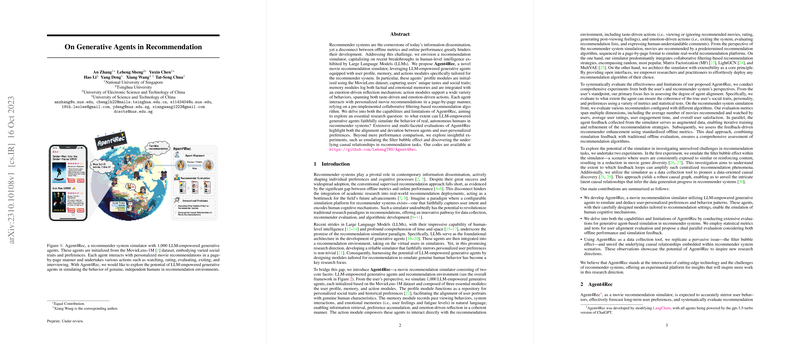An Analysis of Generative Agents in Recommendation Systems
The paper focuses on developing a novel simulation framework named Agent4Rec, aimed at evaluating and improving movie recommendation systems via the utilization of LLM-empowered generative agents. These agents are designed to emulate genuine human behavior and decision-making in recommender systems, guided by user profiles, memory, and action modules.
The authors observe a significant limitation in the current supervised recommendation systems: a disconnect between offline metrics and online performance. This discrepancy limits the integration of academic advancements into real-world applications, emphasizing the need for a more flexible and dynamic evaluative system. The introduction of Agent4Rec serves as an effort to address this issue by providing a simulation environment that models user behavior in a detailed and coherent manner. Herein, generative agents serve as proxy users, defined with social traits and preferences derived from the MovieLens-1M dataset, and further modulated through memory and action protocols.
Agent4Rec Design and Methodology
The fundamental architecture of Agent4Rec is based on defining the generative agents with three core modules:
- Profile Module: This module mirrors user-specific characteristics and preferences. It draws from real user data, emphasizing activity, conformity, and diversity traits to ensure that simulated behaviors align with human decision-making in movie selections.
- Memory Module: Capturing both factual and emotional memories, this module introduces nuanced decision-making generally absent in conventional agents, enabling simulations to reflect genuine human cognitive processes, including the influences of fatigue and satisfaction on user preferences.
- Action Module: Enabling responsive behaviors, agents can perform a variety of actions, from viewing and rating movies to assessing the recommendation lists. These actions are informed by both taste-driven and emotion-driven processes.
The simulation also employs a recommendation environment, leveraging collaborative filtering-based algorithms. This adaptability allows Agent4Rec to simulate and evaluate various recommendation strategies, facilitating continuous improvement through a feedback loop.
Evaluation and Findings
The authors conduct extensive evaluations, focusing on the agents' ability to imitate true human-like behaviors in preference alignment, rating distributions, and response to social traits. They find that the generative agents successfully identify movies aligned with individual preferences, with high accuracy and recall, although with issues in precision attributed to LLM hallucinations. The alignment of simulated rating distributions with real-world data, alongside the robust reflection of social traits, validates the agents' effectiveness.
Further, the authors present a comparison of different recommendation strategies within the simulation, showing that more advanced algorithms generally yield higher satisfaction among agents, mirroring real-world trends. A particularly noteworthy aspect is the simulator's ability to replicate the filter bubble effect and facilitate causal discovery in movie recommendations, showcasing the potential for addressing complex challenges in the field.
Implications and Future Directions
Agent4Rec offers a transformative approach to simulating human interactions within movie recommendation systems, providing a platform that merges cutting-edge LLM capabilities with real-world applicability. This approach opens avenues for more refined A/B testing and deeper insights into unresolved phenomena like filter bubbles and causal relationships. However, challenges remain, notably the constraints arising from relying exclusively on offline datasets and the hallucinations inherent in LLM responses.
Future work could extend the action space to include more nuanced real-world factors, addressing the limitations and enhancing the fidelity of the simulation. Moreover, the continual refinement of LLM models and their alignment with user data could further enhance the stability and accuracy of simulations, paving the way for more robust and insightful exploration of recommendation system dynamics. Through such advancements, Agent4Rec holds promise to inspire new research directions and significantly influence the development and evaluation of recommender systems.
